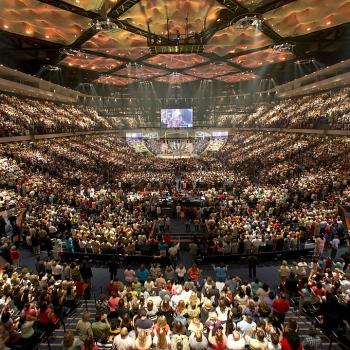In this series, I am discussing three views of history. This is not to say I am writing about how to do history or about what counts as evidence in trying to come to a conclusion about a proposed historical event or person. This is a philosophical question about the nature of history: about the cosmic, natural and anthropological features of a “tensed,” or temporal, world. In other words this is a metaphysical question, albeit one related more to meaning and purpose than to strict ontology or causation. What we are asking is “what is history like,” and “what models of history have been historically offered to explain it?” In part 1, I discussed a common model of history that is found in both ancient and modern versions, namely, history as “eternal recurrence.” In this post, I am going to address another model, which for sake of argument I will simply call “progressivism.”
What Does it Mean to “Progress?”
The term “progressive” is, of course, notoriously overused and often under explained. When used in common parlance, it often connotes a kind of political or moral orientation, e.g., “the Progressives are the Democrats, and the Democrats are Progressives.” Sometimes, perhaps often, the person who identifies with such an orientation is not really aware why they do so. However, regardless of how cognizant a particular progressive person is of why they are progressive does not mean we cannot recognize a few basic assumptions of what progressivism is.
The progressive orientation that many espouse is itself grounded in a particular assumption, namely, that what is is in someway qualitatively better or superior than what was. In other words, there is something about the present that is markedly better than any period of the past. Further, this assumption rests on yet another, often only tacitly implied, assumption. This second assumption is that there is a standard, or goal or state of being by which any given moment, or any particular attitude or any discrete set of beliefs can be gauged or evaluated. For to talk of “progress” is, if one is being genuine, to talk of a particular way things should be. Without some particular way things should be, one could not reasonably talk about “progress.” Instead one could only, if being genuine, talk of “change” or “difference.” But I will come back to this point later in the article.
And so progressivism as it relates to anything, including a view of history, must entail at least two assumptions: first, that there is a goal, or standard or end-state. And, second, that something, here history, is moving toward that goal, or standard or state. History, or, the events of history, be they events of cosmic or merely human proportions, are on this “progressive” view moving in a forward direction. On progressivism, history is advancing in some very real sense. This is not mere change, but end-oriented, meaningful, qualitative development or, if you like, evolution. Progress, in this sense, is less like ice melting into water or water being heated into vapor. These we may just call changes in modes of being. Alternatively, history on this view is much more like a child growing into a young adult or an airplane design becoming more and more aerodynamic.
Finally, if there is qualitative change toward an actual, extant standard or potential end-state, that which makes “progress” progress, then there must exist something that is its opposite. In other words, where there is progression, instead of mere change, there is also something like “regression.” Where there might be development or evolution, there can also be devolution. Thus, for any view that assumes progress is even possible, especially progress in human affairs, a dynamic of conflict emerges. That dynamic entails that some things be assigned to the category “progressive,” while others are deemed “anti-progressive” or simply “regressive.” Of course, who gets to make these determinations is itself a rather controversial point for progressivism.
What Causes Progress?: Hegelianism vs. Marxism
It will be impossible to say anything in such a short space about G.W.F Hegel or Karl Marx that is not both inadequate and uncontroversial. However, I hope to capture here only one small, yet extremely significant, aspect of both thinkers that matters to this discourse. That is namely that both Hegel and Marx understood history to be progressing roughly in the same way I alluded to above. However, what made history progress in this way, i.e., what caused history to be a thing in progress, was for both men something quite different indeed.
The simplest way to differentiate Marx’s view of historical progress from Hegel’s is to consider their ontological views. For Hegel, an “Absolute Idealist,” all of reality just is thought. There is nothing outside of, beyond, or apart from thought. Unlike Kant, who at least posited a real world beyond thought, even if we could know nothing about it, Hegel eliminates any sense of a “real” world that is not an aspect of thought. Hegel’s own maxim elucidates this, when he says “The real is rational, and the rational is real.” However, it is important to note that “the rational” for Hegel is not merely some deflated view of instrumental, or technical reasoning.
The “rational” for Hegel is much more mystical. It is spiritual, in a sense. Hegel, like Spinoza before him, is a pantheist. The “rational” in history is the unfolding of the absolute “Spirit” or Geist through a temporal process. At every stage of this process, the divine is manifesting itself in a new way. Moreover, this new mode of manifestation of the divine Geist entails all earlier manifestations of the divine rationality. What progresses historically on Hegel’s view is, in a qualified sense, god himself, who is always becoming more than what “he” previously was (and never less). Thus, if there is truth, it is not some transcendent or fixed or universal Truth that exists across the ages and over all cultures. Instead, whatever is right now in the current manifestation of the absolute Geist is truth, and this truth is manifest through the culture that now exists.
The end of history for Hegel is the culmination point of Geist. This process is called the dialectic of idealism: an ongoing creative process of mind that is worked out temporally in virtue of a dynamic of “thesis : anti-thesis : synthesis,” or something like “attempt to explain reality : counter-points to that attempt : synthesis of both attempts that leads to a genuine, new insight into reality.” It is important to note, however, that for Hegel this process is not just something that happens between two interlocutors with alternative positions on a given topic. For Hegel, this is the entire structure of the world unfolding in time. This process will eventually progress to a final point or end-state, what one modern theologian called “the omega point.” Hegel’s historicism is, in this sense, the arch-nemesis of later postmodernists like Derrida or Lyotard, who first “deconstruct” Hegel’s highly structured system of history evolving and then, famously, offer absolutely nothing in its place.

Marx’s Materialism: “Flipping Hegel on His Head”
Marx agreed with Hegel as far as history progressing. For Marx, however, the idea of Geist (the idea of “idea”) was a mystification of what was actually real, namely, the material world. Marx’s dialectic was one of the arrangement and rearrangement of matter, not of thought or some mystical spirit of rationality. However, like Hegel, that all “truths” were relevant to historical progress is a core tenet of Marxism. Here is the relevant passage in Das Kapital that shows Marx’ respect for his mentor, yet his desire to “flip Hegel on his head”:
The mystification which dialectic suffers in Hegel’s hands, by no means prevents him from being the first to present its general form of working in a comprehensive and conscious manner. With him it is standing on its head. It must be turned right side up again, if you would discover the rational kernel within the mystical shell.
The rational kernel for Marx is that history progresses through the proper structuring of the material world. The mechanics for this restructuring is not abstract, metaphysical thinking, but concrete economics. For Marx, the end of history comes when the right economics of human life is instantiated in the material world. This is supposed to result in a kind of final liberation from all that alienated human beings from their true nature in history past. Of course, this includes not only abstract philosophy but, more poignantly, religion.
Between Hegel and Marx there are no philosophies of history as impactful that assume some dynamic of historical progression. However, it is appropriate to point out how earlier thinkers in the 18th century thought about progress in history, especially from a political sense.
18th Century Progressivism
Just prior to Hegel, there were several “modernist” thinkers who also saw history as progressing, albeit not necessarily to a definitive end point. Of course, for these, the focus was much narrower than Hegel’s focus. They were concerned mainly with social and moral features of progress, not metaphysical ones. Men like William Godwin or the Marquis de Condorcet believed that given the “new science,” which began roughly with Francis Bacon, and the rapid increase in industry and technology that mankind could literally develop to a point of moral and societal perfection. In his classic treatment of political ideology, Thomas Sowell outlines this view of history, which entails a kind of infinite malleability of human nature:
“Man is, in short, “perfectible”—meaning continually improvable rather than capable of actually reaching absolute perfection. “We can come nearer and nearer,” according to Godwin, though one “cannot prescribe limits” to this process. It is sufficient for his purpose that men are “eminently capable of justice and virtue”—not only isolated individuals, but “the whole species.”
Thomas Sowell, A Conflict of Visions (https://books.apple.com/us/book/a-conflict-of-visions/id1210031663)
Similar to Godwin, Condorcet thought that man could in fact progress toward perfection, even if we could not know, or at least not know now, the limits of that perfection:
Here, too, Condorcet reached similar conclusions. The “perfectibility of man,” he said, was “truly indefinite.”“The progress of the human mind” was a recurring theme in Condorcet. He acknowledged that there were “limits of man’s intelligence,” that no one believed it possible for man to know “all the facts of nature” or to “attain the ultimate means of precision” in their measurement or analysis. But while there was ultimately a limit to man’s mental capability, according to Condorcet, no one could specify what it was.
Sowell, A Conflict of Visions
In stark contrast to their conservative, and more theologically in-formed and con-formed counterparts, like John Locke and Edmund Burke, these representatives of the “unconstrained” view of man (Sowell’s term) really did believe that human history was progressing to some state of perfection–specifically human perfection. Most progressives today, be they political progressives or even technology-driven transhumanists, are inheritors of this particularly western, and, it must be said, white view of historical progression.
Assessing the Progressive View of History
The progressive view of history has a lot going for it. It makes sense of some obvious empirical facts: like the advance of technology in human culture. Man is indeed homo faber, “maker of things,” and it would be a bizarre and irrational thing to think in the age of computers that we have not progressed with regard to the work of our hands. Also, as to our investigation of nature itself, it does seem we have, at least in some regard, advanced our knowledge of the natural world. Perhaps we have not conceived of nature in any novel way, evolutionary theories have existed since ancient times, but one would be hard pressed to say we haven’t gained knowledge at least in degree, if not in kind, about nature and its processes. Minimally one would have to admit that we have more detailed knowledge of the physical world than the ancients did, even if it was often there “in seminal form.”
However, there are other aspects of history that the progressive view seems unable to account for. The cosmos itself is perhaps the most obvious of these, since no physicists or cosmologists believes that the universe will not, at some point, regardless of how distant in the future, die out. If anything, as mentioned in the prior post, some physicists have argued that the cosmos will restart. But ending and restarting is not the same as reaching a perfected state. As such, the 2nd law of thermodynamics seems to soundly defeat that progressive piece of wishful thinking.
Moreover, at the biological level, evolutionary theory does not posit that animal organisms are moving in some goal-oriented direction. The only right understanding of contemporary biological evolution is “change over time.” But that change reduces down to mere survival of organisms. Mere survival, however, says nothing of a qualitative progress of biological organisms. It could be that upon some great future disaster we would turn out to be like the “Morlocks” in H.G. Wells’ classic The Time Machine. But could we really call that “progress?”
Finally, and this point will be addressed more fully in the next post, there is the question of social and moral progress. Some may think it defeatist to say we haven’t progressed morally or socially in comparison with what we think are our barbaric or unscientific ancestors. However, to think we have progressed significantly seems to smack of what C.S. Lewis dubbed “chronological snobbery.” After all, can we really claim moral progress in a world were child sex trafficking has now become the most lucrative form of slavery in all of human history? Can we really claim social progress in a world where a former president has been indicted for now the fourth time?!* Seriously, who could say such a thing and actually believe it to be true?
In sum, the progressive view of history has some serious defects, ones as fatal to its validity as those of the “recurrence view” mentioned in the previous post. As such, we must consider at least one more view of history, the biblical view, in the hopes of finding a model that makes better sense of both that which has come before, and that which we continue to experience today.
* He wrote with great irony


















